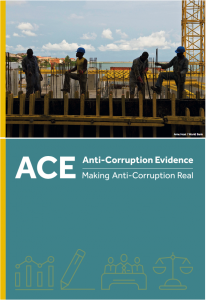
What is ACE?
The Anti-Corruption Evidence (ACE) research consortium – led by SOAS, University of London – takes an innovative approach to anti-corruption policy and practice. With £6 million in funding over five years from UK aid, ACE is responding to the serious challenges facing people and economies affected by corruption by generating evidence that makes anti-corruption real and using those findings to help policymakers, business and civil society adopt new, feasible, high-impact strategies to tackle corruption.
The UK aid-funded Anti-Corruption Evidence (ACE) programme has two components: the SOAS-led ACE Research Consortium (SOAS-ACE) and a parallel programme led by Global Integrity, the Global Integrity – ACE Partnership (GI-ACE). The newly-agreed GI-ACE component builds on an earlier phase of the programme, managed by the British Academy, that ran from 2015 to 2018. Click here to find out more about GI-ACE.
Watch our introductory video here.
Existing anti-corruption approaches have often delivered poor results in developing countries because they have attempted to enforce formal rules using ‘vertical’ agencies such as anti-corruption and tax authorities or public prosecutors. Vertical enforcement is necessary but only works if the rules being enforced are supported by those subject to them, such as businesses, civil society and public service providers.
This ‘horizontal’ support for enforcement only happens when the rules enable these actors to be productive in their own interests. For example, these actors are likely to stop interacting with rule violators, report them to the authorities or directly punish them, when they see these violations as damaging to their own productivity. In rule-following societies, significant horizontal enforcement is critical for adhering to laws and tackling corruption, and helps vertical enforcement – which has limited capacity on its own – to be successful.
Society-wide vertical enforcement thus requires thousands of powerful organisations to assist with horizontal support. This is likely in developed countries where most powerful organisations are productive enough to benefit from general rule of law enforcement, and where economic policies are supportive of productivity. But in developing countries, these conditions are absent or only partially exist. Organisations are thus more inclined to negotiate their own informal arrangements than support the enforcement of rule of law.



